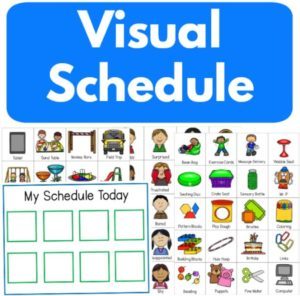Time management strategies

Most parents would agree that life is some degree of organized chaos right now. With worrying about the health and well-being of loved ones, virtual learning, working from home, and trying to keep you and family from going stir crazy…wouldn’t you like to spend some time into making life a little bit easier? It is a perfect time to start increasing your child’s independence through time management strategies.
For preschoolers
You might be thinking I am crazy for suggesting this, but it is beneficial to start teaching these skills early. This will not only make them more independent, but make your days easier in the long run. Time management skills for preschoolers are pretty basic. You want them to start to get a feel for or sense time, so they can start to understand what “we are leaving in 10 minutes” feels like, so they get practice learning how to wait for things they desire. Also consider pointing out the differences between seasons and or day/night. This gives them something concrete to understand that time is constantly changing things in their world like leaves, weather, clothing they would have to wear, etc. Seems silly, but it will help them start the comprehend the construct of time.
Preschoolers would never admit this, but they thrive on routines! Take advantage of this with a pictures schedule. This gives structure to their day and can help them make through a morning routine or to help them complete a task like cleaning their room (break this chore into smaller steps: put away toys, put clothes in hamper, make bed, etc.). If you’re having them create their picture schedule or to do list, ask your child which of those activities do they want to complete first? That way they feel in control of the situation and they still accomplish the tasks you want, but you’ll hopefully avoid the power struggle.

Kindergarten to second grade
A huge advantage to this group, is they are starting to tell time or be able to read calendars. Use this to your advantage! Set a visual timer (a sand timer from a game, download a countdown app on your phone, and egg timer, whatever you have available) and keep the timer nearby and give lots of verbal prompting as time passes, to further reinforce sensing increments of time. That way they can judge time better and realize what they can accomplish in certain chunks of time. Set them up for success, by having a place for commonly used items (pencil, paper, laptop, etc.). That way they do not spend half of their time looking for what they need to complete their homework.
Don’t be afraid to hold your child accountable for how they budget their time for school work and play time, and be consistent with consequences that result from their choices. Do your best not to make empty threats (saying you can’t have tablet time, before they finish their school work, then allowing to play on their tablet, even though their work is not done). Natural consequences are okay and will help your child learn! It may not be fun initially, but next time, they will definitely think twice about not completing their work.
Grades 3-5
Continue to make schedules and using a planner to begin to estimate and budget their time, as well as, plan for long term tasks. Estimating and budgeting time is tough at first for most kids, that is why reflection afterwards is essential. Ask your child would it have been helpful to have budgeted more time for that book report? Should you have started the reading the book earlier? What would you change if you could do it again?
Help them plan for these long-term assignments by breaking the task into smaller steps that are easier to accomplish. Ask you child questions that will help them make priorities. You cannot write to a book report unless you have read the book, right? Help them determine what is essential to completing the task, and what has to happen first, second, third, etc. It is important for kids age to distinguish what they “have to do” and what they “want to do.” While some kids may think they “have to” play on their Nintendo Switch, it is much more of a want than a need.
Middle School and High School
This age group is all about refining the previously discussed skills, and highlighting your child’s strengths. Figuring out their learning style can be super helpful! Are they a night owl or an early bird? A visual or auditory learner? Play to their strengths and plan their most challenging tasks when they are most likely to be productive and how they will best retain the knowledge.
Another key take home, is helping your teen understand priorities without telling them what to do. Say they want to go hang out with friends or go to movie on a Sunday night, when you know they have at test the next day. Your teen will just think you are being unfair if you give a flat “no” to going to the movie. Instead you could try problem solving the situation. “When will you study for your test if you want to go to the movie? Show me your plan, then we can talk about going to the movie.” This will help them take ownership and plan their time for the weekend wisely.
Stress can be a major factor to poor time management. Help your teen learn how identify and deal with the two kinds of stress, internal and external stress. Internal stress being self-imposed pressure or expectations they place on themselves, while external being results of deadlines or someone else’s expectations. It is important fill their toolbox with tools to combat stress, by starting tasks earlier, asking teachers for help, and relaxation strategies or other outlets.

I hope you can use some of these activities to make your lives a little easier each day! For more advice, ask your therapist for more time management strategies!
For more information, visit http://www.abcpediatrictherapy.com
Sources:
https://www.scholastic.com/parents/family-life/parent-child/teach-kids-to-manage-time.html
https://www.verywellfamily.com/how-to-teach-your-kids-time-management-skills-4126588
7 Time Management Tips for Teens: Helping Them Stay On Track
Developmental Checklist
Is your child meeting their developmental milestones?
 Skip to content
Skip to content